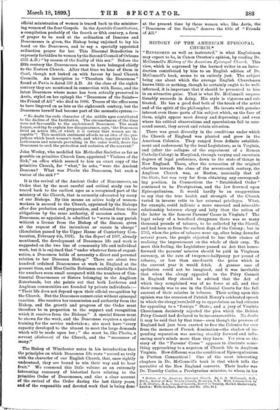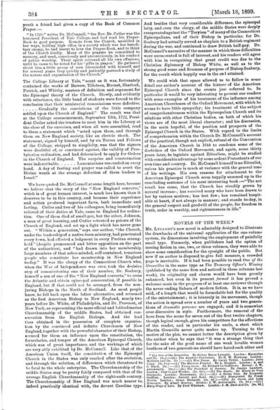McConnell's History of the American Episcopal Church. This view, which
is expressed by the learned writer in an Intro- duction contributed by him to an English edition of Dr. McConnell's book, seems to us entirely just. The subject being one about which the average English Churchman knows little or nothing, though he certainly ought to be well- informed, it is important that it should be presented to him in an attractive guise. That is what Dr. McConnell unques- tionably succeeds in doing. His style is vigorous and cul- tivated. He has a good deal both of the touch of the artist and of the spirit of the philosopher. He invests with genuine interest even those parts of his subject which, on the face of them, might appear most dreary and depressing ; and even where his critical observations and speculations fail to com- mand assent, they arrest and retain attention.
There was great diversity in the conditions under which
the Church of England was planted and grew in the American Colonies. They ranged from definite establish- ment and endowment by the local Legislature, as in Virginia, and (after the collapse of the experiment of a Roman Catholic Colony) in Maryland, through varying and uncertain degrees of legal preference, down to the state of things in New England. There, after the revocation of the original charters towards the close of the seventeenth century, the Anglican Church was, at Boston, nominally that of the State, but was very far from obtaining any correspond- ing position. In Connecticut the "Established Order" continued to be Presbyterian, and the law frowned upon Episcopalianism. It would hardly be an exaggeration to say that the true health and strength of the Church varied in inverse ratio to her external privileges. What, for example, could indicate a more unsound and miserable relationship between clergy and laity than the action of the latter in the famous Parsons' Cause in Virginia P The legal salary of a beneficed clergyman there was so many thousand pounds of tobacco, to be collected by the Sheriff, and had been so from the earliest days of the Colony ; but in 1763, when the price of tobacco went up, after being down for several years, the people objected to lose their chance of realising the improvement on the whole of their crop. To meet this feeling, the Legislature passed an Act that hence- forward the parsons' salaries should be paid in Virginian currency, at the rate of twopence-halfpenny per pound of tobacco, or less than one-fourth the price which in the current year it would fetch. A grosser case of spoliation could not be imagined, and it was inevitable that when the clergy appealed to the Privy Council in England they should be advised that the Act of which they complained was of no force at all, and that their remedy was to sue in the Colonial Courts for the full amount of their salaries in tobacco. Their acting upon this opinion was the occasion of Patrick Henry's celebrated speech in which the clergy;werelheld up to opprobrium as bad citizens for appealing to a " foreign " State ; and a jury of Virginia Churchmen decisively rejected the plea which the British Privy Council had declared to be incontrovertible. No doubt it may be said that by that time—even though the prowess of England had just been exerted to free the Colonies for ever from the menace of French domination—the shadow of im- pending separation was moving steadily forward and influ- encing men's minds more than they knew. Yet even so the story of the "Parsons' Cause" appears to illustrate some- thing approaching to a negation of Church life in Anglican Virginia. How different was the condition of Episcopalianism in Puritan Connecticut ! One of the most interesting
chapters in Dr. McConnell's book is that which tells the narrative of the New England converts. Their leader was Dr. Timothy Cutler, a Presbyterian minister, to whom in his
• History of the American Byiecopat Ckurch. By S. D. McConnell, D.D., D.C.L., Rector of Holy Trinity Church, Brooklyn, N.T. With Introduction by J. H. Overton. M.A., Canon of Lincoln. Rector of Gamley, Market liarboronsk. London : Wells Gardner. Dorton. and Co. IlOs. 6d.1
youth a friend had given a copy of the Book of Common Prayer :—
" In 1720," writes Dr. McConnell, "the Rev. Dr. Cutler was the honoured President of Yale College, and had read his Prayer- Book to good purpose. Remote from the Church, unskilled in her ways, holding high office in a society which was her heredi- tary enemy, he bad learnt to love the Prayer-Book, and to think of the Church kindly. Many of the prayers he committed to memory, and used, consciously and unconsciously, in his conduct of public worship. Their spirit coloured all his own effusions, until he came to be noted for his 'gifts in prayer.' He gathered about him a little group of men likeminded with himself, and for several years they quietly and patiently pursued a study of the nature and organisation of the Church."
The College Library at Yale, "scant as it was, fortunately contained the works of Barrow, Tillotson, Burnet, Sherlock, Patrick, and Whitby, masters of definition and argument for the Episcopal theory of the Church. Slowly, and evidently with reluctance, the little band of students were forced to the conclusion that their ministerial commissions were defective.
Gradually the convictions of the little company settled upon the Church of England." The result was that at the College commencement, September 13th, 1722, Presi- dent Cutler asked the trustees to meet him in the Library at the close of the exercises, and when all were assembled, read to them a statement which "acted upon them, and through them on New England society, like an electric shock. The statement, signed by himself, and by six Tutors and Fellows of the College, stripped to simplicity, was that the signers were doubtful of, or convinced against, the validity of Pres- byterian ordination, and had determined to apply for Orders in the Church of England The surprise and consternation were indescribable Lamentations resounded on every hand. A day of fasting and prayer was called to avert the Divine wrath at the strange defection of these leaders in I sra,e1."
We have quoted Dr. McConnell at some length here, because we believe that the story of the "New England converts," which is of great human interest, is much less known than it deserves to be in this country, and because their experience and action produced important facts, both immediate and lasting. Cutler and two of his colleagues, being immediately relieved of their duties at Yale, came to England for ordina- tion. One of them died of small-pox, but the other, Johnson, a man of great learning, and Cutler returned as priests of the Church of England, and set up a light which has never gone out. "Within a generation," says our author, "the Church, under the leadership of a native-born ministry, had penetrated every town, had effected a lodgment in every Puritan strong- hold" (despite pronounced and bitter opposition on the part of the authorities), and "had drawn into her membership large numbers of that sober-minded, self-contained, tenacious people who constitute her membership in New England to-day." It was the clergy of the Connecticut Church who, when the War of Independence was over, took the decisive step of commissioning one of their number, Dr. Seabury, himself a son of one of the "New England converts," to cross the Atlantic and obtain episcopal consecration, if possible in
England, but if that could not be arranged, from the non- jnring Bishops in the North of Scotland. As most people know, he fell back upon the latter alternative, and returned as the first American Bishop to New England, nearly two
years before Dr. White, of Philadelphia, and Dr. Provoost, of New York, as representing the more official and latitudinarian Churchmanship of the middle States, had obtained con- secration from the English Bishops. And the lead
thus obtained in the possession of complete organisa- tion by the convinced and definite Churchmen of New
England, together with the powerful character of their Bishop, secured for them an influence upon the constitution, the formularies, and temper of the American Episcopal Church, which was of great importance, and the workings of which are very ably exhibited by Dr. McConnell. Like that of the American Union itself, the constitution of the Episcopal Church in the States was only reached after the evolution, and through the solution, of differences which threatened to
be fatal to the whole enterprise. The Churchnianship of the middle States may be pretty fairly compared with that of the
average English Churchmanship of the eighteenth century.
The Churchmanship of New England was much nearer to. indeed practically identical with, the devout Caroline type.
And besides that very considerable difference, the episcopal laity, and even the clergy, of the middle States were deeply exasperated against the " Toryism " of many of the Connecticut Episcopalians, and of their Bishop in particular, for Dr. Seabnry had actually served as chaplain to a British regiment during the war, and continued to draw British half-pay. Dr. McConnell's narrative of the manner in which these difficulties were surmounted is full of interest, and his readers will agree with him in recognising that great credit was due to the Christian diplomacy of Bishop White, as well as to the strong good sense and firmness of purpose of Bishop Seabury, for the result which happily was in the en a attained.
We could wish that space allowed us to follow in some detail our author's account of the history of the American Episcopal Church since the events just referred to. In particular it would be very interesting to present our readers with some examples of his treatment of the influence among American Churchmen of the Oxford Movement, with which he seems to have little sympathy; his treatment of the subject of comprehensiveness within the Episcopalian Church and its relations with other Christian bodies, on both of which his views are of the most liberal character ; and his discussion, in the main hopeful, of the position and prospects of the Episcopal Church in the States. With regard to the limits of comprehension within the Church Dr. McConnell's account of the practical, though not explicit, refusal of the Convention of the American Church in 1844 to condemn some of the doctrines of the Oxford Movement, and again, some thirty years later, to legislate against Ritualism, might be studied with considerable advantage by some ardent Protestants of our own time and country. Dr. McConnell himself is no Ritualist, unless his practice is much at variance with the general tone of his writings. His own reasons for attachment to the American Episcopal Church seem happily summed up in the concluding sentence of his most interesting book :—" The net result has come, that the Church has steadily grown by natural increase ; has received many who have been drawn to her by various motives ; has lost few ; has remained hospit- able at heart, if not always in manner; and stands to-day, in the general respect and goodwill of the people, for freedom in truth, order in worship, and righteousness in life."







































 Previous page
Previous page